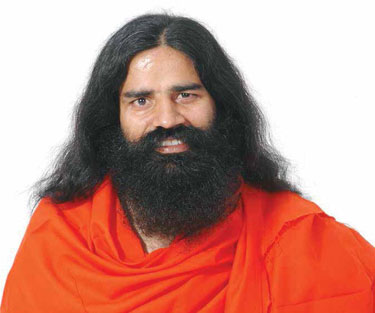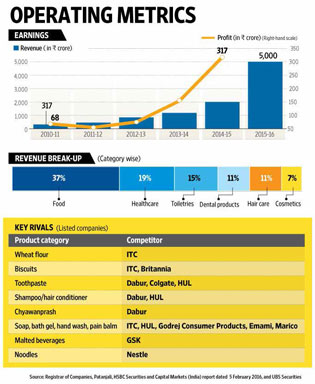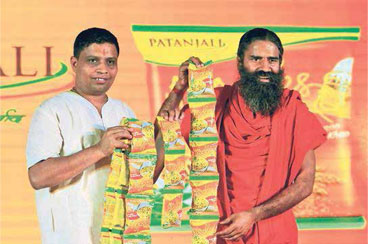Swami Ramdev is one of the country's best known yoga guru cum entrepreneur.
He proudly says that he is a Yogi with a scientific bend of mind. We for sure know his business acumen too is so sharp that his business empire is of whopping Rs. 5,000 crore in a span of one and a half decades- all set to grow to Rs. 10,000 crore ina few years, as claimed by him.

While his brainchild ‘Patanjali’ a singular line of Ayurveda based cosmetics, toiletries and food products and 'Divya' comprising his Ayurvedic medicines, has taken the country by storm and is keeping eminent multinationals on the edge, Baba Ramdev believes in sustainable, home grown development and the strength of Swadeshi goods to contribute to India's growth story. And how the eradication of poverty is the key to peace. Read on...
"I was born in a small village; my parents are illiterate. I used to study in a government school by using second-hand books. Until Std V, my education was free of cost; in Std. VI, it became RS. 2. If I were to calculate the cost of my entire education, it would be in the realm of RS. 500.
When Patanjali Yogpeeth was established, then too, I did not have RS. 500 on me, but that did not stop its growth. Today it has emerged as the Mecca of Yoga, not just for India, but for the world too. The Yogpeeth can accommodate up to 10,000 people, which is considerable a number.
Lately, there has been much talk of the merits of Swadeshi (home-grown) versus Videshi (foreign goods.) Different books and sources say different things. Whom to believe? Personally, I don’t get affected by the things I hear, I see or I read. Instead, I use a simple technique. I just ask myself is it scientific, universal, and secular? If it is, that's the only truth I keep in mind, everything else is a lie.
As far as politics is concerned, there are many stories, and many secrets − some of that belong to those in governance, others to those that have lost their right for governance. It's best to keep those secrets as they are. I have experienced politics from close quarters, and I guess I know what I am talking about. I have had good personal associations with as many as seven Prime Ministers of the country, 30 Chief Ministers and 400-500 Members of Parliament (MPs). I do agree that there are challenges in politics and differences based on caste, religion and family. You do hear about power of money and Swapnavaad (selling of dreams.)
Sure, these are ongoing challenges in the world of politics, but then, don't such challenges exist in the corporate world, right from buying raw material to processing, research, manufacturing, and finally marketing and sales? They do. Those who go against powerful companies are crushed or bought over. However, this happens in every sector, be it politics, health, economics or research. True youth power is about facing all these challenges, head on! Never think destructive; think positive and act positive. Keep on trying. Once in a blue moon, greatness enters the world and changes it forever − be it Lord Ram, Chanakya or Chhatrapati Shivaji Maharaj.
If an Individual or a country Is not proud of Its history and can't handle the present as It Is, then they should not even think of their future. the past has Important lessons for all

If an individual or a country is not proud of its history and can't handle the present as it is, then they should not even think of their future. The past has important lessons for all. Read history, and in addition to it, create some of your own. When Mahatma Gandhi spoke about Swadeshi , or goods manufactured locally, he knew where the world was heading; he had a foresight. Similarly, when he- roes like Chandrashekhar Azad, Bhagat Singh, Sukhdev and Rajguru spoke about Swadeshi − they knew its importance. But if you ask me, the crux of the matter is not Swadeshi or Videshi − it is the meaning of those terms and what they actually signify.
What is the right definition of prosperity, business and development? Inclusive, sustain - able, decentralised and impartial prosperity, to my mind, is real business, real growth and eventually real development. Any company, be it Swadeshi or Videshi that has a business structure which is inclusive, sustainable, decentralised and which aims for prosperity sans unfair activities, is what we all want. In the final analysis, it is all about the values and practices they propagate.
Take for example, fairness creams that are sold in widely; I have not seen anyone who has turned fair till date. This is just a sale of dreams. What's more, they are selling a cream at RS. 50 even though the cost price may just be RS. 5. Which would mean a profit of 900 per cent! Is this fair?
Take the example of t-shirt but with a logo of a foreign brand. We produce the cloth and they just add the logo. Same story with leather. We manufacture the leather; our workers do all the work and yet the shoe carries tag of other country.
Someone asked me, "Why are you manufacturing jeans?" I replied, ‘If India is supplying 60- 70% raw material for jeans, then why not make India a global brand?’

MNCs come to the Indian market to take away profits; they don’t come with any capital; they are not in love with us. They come with RS. 1 and go back with RS. 100 − this is the real character of an MNC.
On the other hand, Patanjali has contributed up to RS. 20-25,000 crore towards charity work in India. I am a villager, I am proud of my roots − and whatever I earned is for the country’s well-being.
I am an unpaid brand ambassador for Patanjali and Acharya Balkrishna is the unpaid MD, CEO and shareholder. No businessman holds even 1% of Patanjali’s share and the CEO of Patanjali will not be any elite businessman, he will be like me a Baba.
Patanjali's profit will be used for India’s wel- fare and the construction of the World’s Largest University (Vishwa Vidyalaya) on Indian soil. The students will learn not only the latest technologies but also the teachings of Vedas , Guru Granth Sahib and other such scriptures.
When someone asks me: What do you see when you see a Muslim with a beard just like yours? My reply is the same, "When I see a Muslim, I see God." When they are not satisfied with my answer then I say, “I see my blood when I see a Muslim." Our ancestors are the same, so why the rivalry, just because the religions are different?
A human being is someone who is useful to himself, his society, his country and the world. Many people ask me: what should we call you − a businessman or a yogi , hath yogi , raaj yogi or a wrestler? I say, don’t bother to call me anything, I do know that I am useful to the hu- man race and my country. We should do well for society; there is no need to think for one self.
Never have a single perspective in life; I also say the same thing about politics − there may be zillions of hurdles but face them and don’t be a quitter.
someone asked me, "Why are you manufacturing jeans?" I replied, 'If India Is supplying 60- 70% raw material for jeans, then Why not make India a global brand?'

Once you decide on your goal, do not stop; just go for it! No matter how long it takes — days, months or even years, accomplish your goal!
Since the age of nine, I have never stopped working or have taken a vacation. People say one must enjoy life, but I enjoy every moment in my life. You should be as soft as a flower and as strong as steel this should be your inherent characteristic.
The one great truth that changes for every generation is technology. In earlier times, wars were the greatest reality of all. The one with the greatest military power ruled the roost. Now the baton has passed onto technology, be it agriculture, business or anything else.
We are spending crores of rupees on purchasing technology from the West and we even have a budget for that. We import some machines if we are not able to manufacture them in India. If you want to use technology, take it by all means, but why to come in India and then sell the goods and commodities?
Science and technology deserve to be respected. But then, what sort of technology is used for making soap, oil and shampoo? Why complicate the truth behind it? They are lying in the name of science, progress, history, business and prosperity.
Today, India is 99% dependent on the youth for their abilities and their knowledge. Twentyfive years ago, the reality was different, but today’s reality is that if Indian youngsters are confident about themselves, then they can win the world. Earlier, there was a need for MNCs but today there is no need; this is today’s reality. Patanjali took the first loan of RS. 50 crore and in the next three years, we took a loan of RS. 500 crore. From that amount we made a turnover of RS. 5,000 crore rupees. Due to demonetisation, we faced some difficulties, but we are planning to double the profit, taking the figure up to RS. 10,000 crore. And in the next five years, we are planning to make profit of one lakh crore rupees. We start- ed with RS. 500 crore rupees, and are all set to make an economical empire out of it − without causing harm or loss to anyone ; instead we are contributing to our nation's progress. When we make something, we must ask ourselves, what are we doing exactly? Sure, there is a lot of revenue generated from selling beers and wines, but then, much more of it is spent on treatment of diseases like TB, cancer and so on. This is not development. I don't accept a single rupee of charity from those in the business of selling tobacco or alcohol.
If there are no factories producing alcohol in Muslim countries, why can’t this be India’s situation also? There is no reason to get high to get entertained! In order to be happy you don’t need to do drugs and drink. You have to be in a clear state of conscious mind and then experience happiness.
MNCs take away so many jobs from different sec - tors, which results in unemployment. Patanajli has employed one lakh people directly and one crore people indirectly. I have not graduated from Harvard or Oxford. I studied in a Gurukul, my parents are illiterate, and I am a Baba.
When I go to Bangladesh and countries in Africa, I will not take profits to India; I will use for the welfare of their poor. My philosophy is not to earn money and live a lavish life. My philosophy is to use that money for the welfare of the poor people of that country.
In a couple of years, students from Stanford, Harvard, Oxford, Cambridge, IITs and IIMs will be compelled to learn about Patanjali. We never kept an eye on any rich man’s pocket; instead, we enrich the lives of all those we touched. I am not giving my examples because I am a great man; I am like you, and I have five elements in me, the same as you do. I have a soul and a super soul just like you. Iam a sanyaasi , but a scientific one. Believe in scientific facts, don’t come under anyone’s influence. We should help underprivileged countries. People get aggressive about Pakistan. Eradicate their poverty and they will never turn on India. Illiteracy and poverty are the biggest negatives in the world. When you think about anything, think on a larger scale. Man's actions are based on his thoughts. Therefore, his thoughts should be clear.
once you decide on your goal, do not stop; just go for It! no matter how long It takes days, months or even years, accomplish your goal
There aren't very many companies that have received so much media attention lately; but then how many can boast of such a trajectory? A closer look at the home-grown FMCG company, Patanjali Ayurved Limited, that has made established market leaders sit up and take notice in a span of just 10 years. Dealing in an assortment of mineral and herbal products, the founders of the company-Baba Ramdev and Acharya Balkrishna are not shy about stating unequivocally that they're in it for the long haul. And that, soon enough, all the world will know of Patanjali. A closer look at a success story scripted in the soil-but reaching for the sky.
By kalyani sardesai
Even as Hindustan Unilever, India's largest consumer goods company, launches around 20 products toothpastes, skin creams, soaps and shampoos under its existing Ayurveda brand 'Ayush' industry watchers put it down to the snook crooked by a relatively new entrant Patanjali Ayurved Limited.
The brainchild of Yoga guru Baba Ramdev and Acharya Balkrishna, the surprise challenger in waiting to the MNC has become a RS. 5,000 crore company within a decade. While this is nowhere close to HUL's RS. 30,000 crore plus revenue, Baba Ramdev's company has caught the attention of all fast moving consumer goods giants and is not a competitor to be taken lightly.
Today, Balkrishna has made it to the list of India's richest men. While Ramdev is busy propagating Yoga and Ayurveda to create a market for the products, while Balkrishna creates the products.
The Patanjali story was first scripted in 1995, in Haridwar when Ramdev and his close associate Acharya Balkrishna set up Divya Pharmacy to make Ayurvedic and herbal medicines. The medicines said to be safe, effective and result oriented proved so popular that Ramdev and Balkrishna sought to scale and diversify into other products. But, that was tough, since Divya Pharmacy was registered under a trust.
However, with both Ramdev and the products gaining the approval and trust of rich NRIs, substantial funds began flowing in, which in turn helped to get bank loans. Thus was born Patanjali Ayurved, a private company in 2006, which has since rolled out a range of products in healthcare, hair care, dental care, toiletries, food and more.
Since then the success story has gone from strength to strength.
Be it Baba's rise to national fame as a yoga guru through programmes on TV channels to constant media attention, the story has enjoyed one effective link after the other, which has resulted in its rebounding success.
Not only are the products great, they are smartly priced with small profit margins.
"Profit has never been our main aim as making money off patients is against the philosophy of Ayurveda," Ramdev has often been quoted as saying. Similarly, employee salaries are modest and input costs low as they source directly from farmers - sans middlemen - plus their administrative costs, are in the realm of 2 per cent as against an average of 10 per cent.
In the early days, Patanjali relied on its own channels of distributors, Chikitsalayas (franchise dispensaries) and Arogya Kendras (health centres which sell Ayurvedic remedies). Once it turned to retail outlets from 2011, revenue began to multiply manifold. In May 2016, it had as many as 4,700 retail outlets throughout the country.
While the founders have said that Patanjali is happy to co-exist with indigenous companies, MNCs are a different story. "We have a simple principle: we want to replace MNCs," Ramdev has bluntly said.
To that end, the company is also spending on advertising, which it did not initially.
Add to that the Swadeshi factor and a growing knowledge of India's indigenous medicine system Ayurved and it's been win win all the way. Also, the sheer range of quality products in the basket cover vast and varied ground be it desi ghee or its toothpaste, 'Dant Kanti', which interestingly, brought in revenues in the realm of RS. 200 crore in 2014-15, in just five years of its launch.
According to industry analysts, Patanjali successfully follows a ‘Branded House’ strategy whereas other companies in the consumer goods sector like P&G and HUL follow a ‘House of Brands’ strategy.
As per the "Branded House" strategy the company is the brand and all the products produced will be promoted under one brand. Similarly, Patanjali is following the branded house strategy and is launching various products under one brand, i.e., ‘Patanjali Ayurveda’. Even if you look at their advertisements, they don’t promote individual products (say a toothpaste). Instead, they promote the entire brand, which helps them save marketing and advertising costs as well.
On the other hand, the House of Brands strategy promotes development of subbrands rather than one parent brand. This is primarily done to remove the dependency of the company on one single brand. So, in case if one brand doesn’t do well, the company can still earn revenues from other brands and the failure won’t hurt the company badly.
Looks like Patanjali took those risks and is reaping the rewards.
A major reason for Patanjali's success has been its slow and steady visibility. From selling products online to the ubiquitous store at airports and railway stations, the products are in all spaces reliable.
As per reports, Patanjali has tied up with Pittie Group and Future Group in October 2015. Ac- cording to the terms of the tie up with Future, all Patanjali products will be sold directly in Future Group outlets.
That's not all. Patanjali products are also available in trade stores like Hyper City, Reliance Retail and Star Bazaar.
Patanjali Ayurved has also started its FMCG expansion in form of dealership and distributorship channels across the country and expects wider growth in overseas distribution as well.
The company manufactures 444 products, including 45 types of cosmetic products and 30 types of food products. According to Patanjali, all the products manufactured by Patanjali are made from Ayurvedic natural components. Patanjali Ayurvedic manufacturing division has over 300 medicines for treating a range of ailments and body conditions, from common cold to chronic paralysis.
Broadly, the products may be divided under the following categories:
A team of Food Safety and Drugs Administration (FSDA) based in Meerut has found a Patanjali Atta Noodles sample "sub-standard", with ash content in the tastemaker exceeding the prescribed limits by nearly three times, even higher than Maggi samples. Also as per the Food and Safety Standards of India, neither Patanjali nor Aayush, which are the two brand names under which Patanjali got licenses, have got any approval for manufacturing instant noodles.
Despite the rumblings of discontent, the company's stock is still in the positive.

As of today, Patanjali Food and Herbal Park at Haridwar is the main production facility operated by Patanjali Ayurveda. The company plans to establish further units in India and in Nepal.
"In next 5-10 years, the entire world will go for Patanjali products. I am neither comparing with others nor my aim is to bring down the business of others," Ramdev has been quoted.
However, the greatest challenge continues to be the giant HUL's long established presence and many more outlets.
However, what works in Patanjali's favour is the sheer number of increasingly health conscious people.
According to Nielson, the health and wellness segment is worth a sizable RS. 33,000 crore and growing. Patanjali, with its Ayurvedic product line, has been able to capitalise on this changing consumer behaviour and hence make an impact.
Experts also caution that Patanjali should ensure that it innovates its products with time. It shouldn’t just stick to the traditional way of marketing and promotional strategies. It should be aware of the fact that time changes consumer behaviour and the company should also evolve with its customers to fulfil their needs and demands.
Also, the focus on quality needs to be relentless, even as the company can't afford to ignore the relationship HUL and P&G have built with customers over the years.
Still, given the company's strong background and Ramdev's firm reiteration that quality and the basic principles of Ayurveda won't be compromised, there's no reason why the company can't give the biggies a bigger run for their money.
Keep watching this space. We did warn you at the outset that the corporate wars just hotted up.
by Vinita Deshmukh